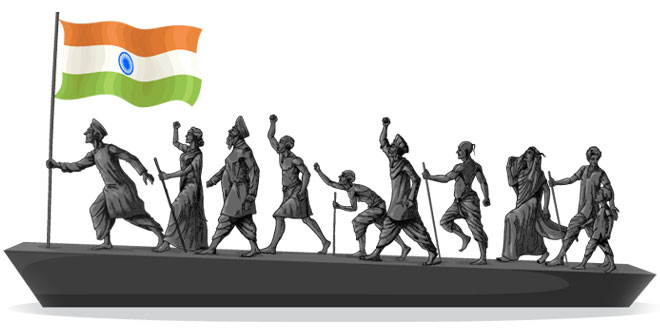Question: Write a short note about the foundation of the Indian National Congress.
Answer: The foundation of the Indian National Congress:
- In 1885, the educated elite class formed the Indian National Congress with the support of retired British official A.O. Hume. Its leaders were Surendra Nadi Banerji, Dada Bhai Naoroji, Ramesh Chandra Dutta, Pheroz Shah Mehta and Gopal Krishna Gokhale etc. They were mild leaders and believed in pursuation, holding yearly sammelan and in passing resolutions demanding senior Government posts for Indians and more representation. Consequently Act of 1891-92 was passed but it does not satisfy them.
- As new extremist class emerged under the leadership of Bal Gangadhar Tilak, Lala Lajpat Rai and Bipin Chandra Pal which believed in pressure and agitation and opposed policy of petition and pursuation. But from 1885 to 1905. Congress was dominated by mild leaders and followed policy of petitions and pursuation. In 1905, partition of Bengal annoyed Congress leaders, who encouraged people to boycott. British goods and oppose partition by agitation. Tilak said “Freedom is our birth right and we will have it.” Thus policy of petition and pursuation failed, British Government followed policy of divide and rule and of prosecuting extremists and of appeasement to mild leaders.
- Due to policy of divide and rule and appeasement, Act of 1909 was enacted, based on communal representation and to appease mild Congress leaders more constitutional rights were given and Muslim League was encouraged.
- In 1895, Dr. Annie Besant founded Home Rule League which was supported by some Congress leaders including Tilak.
- During First World-War of 1914-18, leaders and people supported Britishers as President Wilson announced we are fighting to make world safe for democracy. In 1917, Secretary of State Montague announced to confer constitutional powers, but in 1919, Jalianwala Bagh episode happened which annoyed people of India. The Congress came under the leadership of Mahatma Gandhi. In 1921, he launched non-cooperation movement and in 1925, All Parties Conference under him prepared a Constitution of India Bill as they were not satisfied by Act of 1919, conferring dyarchy to Indian provinces.
- In 1928, Motilal Nehru Committee demanded rights of Cabexs Corpus and non discrimination on the basis of race, religion and creed etc. In 1935, Government of India Act was passed which gave more representation and powers which enabled Congress, Muslim League and other parties to form their ministries in provinces. Act of 1935 became basis of Indian Constitution.
Question: What were the demands of the Indian National Congress in the opening decades of the twentieth century?
Answer: The Indian National Congress (INC, often called Congress) is a broad-based political party in India. Founded in 1885, it was the first modern nationalist movement to emerge in the British Empire in Asia and Africa. From the late 19th century, and especially after 1920, under the leadership of Mahatma Gandhi, Congress became the principal leader of the Indian independence movement, with over 15 million members and over 70 million participants. Congress led India to independence from Great Britain, and powerfully influenced other anti-colonial nationalist movements in the British Empire. Congress is a secular party whose social liberal platform is generally considered to be on the centre-left of Indian politics. Congress social policy is based upon the Gandhian principle of Sarvodaya—the lifting up of all sections of society—which involves the improvement of the lives of economically underprivileged and socially marginalized people. The party primarily endorses social liberalism — seeking to balance individual liberty and social justice, and secularism — asserting the right to be free from religious rule and teachings. After India’s independence in 1947, Congress formed the central government of India, and many regional state governments. Congress became India’s dominant political party; as of 2015, in the 15 general elections since independence, it has won an outright majority on six occasions and has led the ruling coalition a further four times, heading the central government for 49 years. There have been seven Congress Prime Ministers, the first being Jawaharlal Nehru (1947–64), and the most recent Manmohan Singh (2004–14). Although it did not fare well in the last general elections in India in 2014, it remains one of two major, nationwide, political parties in India, along with the right-wing, Hindu nationalist, Bharatiya Janata Party (BJP). In the 2014 general election, Congress had its poorest post-independence general election performance, winning only 44 seats of the 543 member Lok Sabha.
 Class Notes NCERT Solutions for CBSE Students
Class Notes NCERT Solutions for CBSE Students



Pura book hi chap thya hai
Sala fake
Please don’t paste the nude advertising. Many times complained for this. But no solutions….
The advertisements are provided by Google depending on cookies or last search made on your computer or smartphone. Please clean your cache, these will stop appearing. It’s not our hand. – Admin